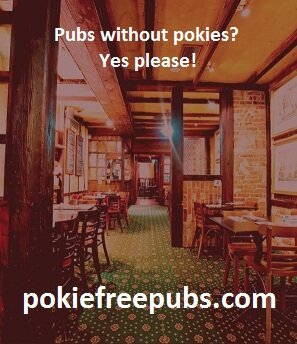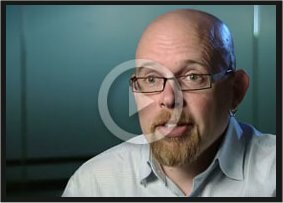In 1995, without any prior gambling history and with the world seemingly at my feet, I played a poker machine for the first time; five years later, I played one for the last time. That period covered three years of full-blown poker machine addiction, and a number of attempts to quit, with accompanying relapses. But in 2000, I played my last poker machine, and I haven’t played one since.
I floated through the next ten years; I didn’t gamble, but I never addressed my problem. I simple put it to one side, ignored it, hoped it would go away. Of course it never did; the urge to play still rose up every now and then, usually at times of stress; I simply learned how not to give in to that urge. I was sleepwalking through my life.
Fourteen months ago I woke up. My impending 40th birthday inspired me to look back on my life, what I’d done, and try to work out where I was going to go next. I realised that I’d been avoiding my past for all these years and so I started looking at the poker machine industry with fresh eyes. What I saw horrified me; nothing had changed, certainly not for the better. The machines were more complex, the volumes being spent were higher, and the efforts of a succession of governments seemed to be completely ineffectual. Victoria was gambling more than ever before.
I grew angry, and I decided to write about that anger. Remaining anonymous, I started a blog. Quickly my focus moved away from my personal circumstances, as I learned more and more about the shady dealings going on behind the scenes, the people whose lives had been torn apart, the industry that defended every dollar it tore out of the community. I began writing about that, and slowly people began to read what I had to say.
I met people, others who had an interest in the harm caused by poker machines, and as my network grew, so too did my blog. I dropped the veil of anonymity, outing myself by name as a problem gambler on my blog and on Twitter, and the outpouring of support that I received was incredible. So too was the feeling of relief; standing up and admitting to what I was, was both terrifying and liberating at the same time.
That marked a pivotal point in my recovery from my poker machine addiction. With my name and my past out in the open, I cranked up my writing and my gambling reform advocacy to even higher levels. I spoke about my past candidly with anyone who was interested, doing radio and newspaper interviews, attending seminars, doing everything I could to raise the profile of problem gambling in the community. I was strong, I was recovered, I was going to make a difference. Just last week I had taken part in a Monash Uni study that I believed was going to provide valuable insights into the risks of problem gambling in Victoria; it was all good. All good.
And then came this morning.
I was contacted some weeks ago by FAHCSIA about making a vodcast for their official problem gambling website. They had filmed a number of vodcasts some time ago, featuring people I already knew such as Gabi and Peter Byrne, and I thought they were brilliant. I agreed to take part, and this morning they flew down to Melbourne from Canberra and we got down to business.
I expected to have a good chat with the interviewer, talking about my past, what I was doing now, what I thought needed to be done. I certainly didn’t anticipate getting upset; by now I was completely open about who I was and what I’d done.
I should have realised that reality refutes expectation. A short way into the interview, I was asked about why I couldn’t speak up about my problem when I was gambling; why I felt unable to seek help.
I started to answer, and found that I couldn’t. The words wouldn’t come; I choked up and tears welled in my eyes. It had been eleven years since I’d played a poker machine, eleven years of running away from my past before facing it, embracing it, and owning who I’d been and what I’d done.
And still I wept.
How can I explain it? Unbidden, the blackness of those days rose up out of nowhere and smothered me. Instantly, unexpectedly, I was back in front of a machine, my last dollar spent and facing the knowledge that the grocery and rent money was gone again. I could feel the eyes on me; not those of the people in the room with me, but all the people over all the years that I’d hurt, lied to, deceived. I could feel again the judgement that I’d always felt hanging over me, the condemnation of a society that puts problem gamblers lower than the bottom rung.
How do you explain the fear? How do you admit that you couldn’t seek help, vindication or forgiveness because you knew you weren’t worth the trouble? How do you describe the loathing you feel for yourself as another lie is told and believed without question?
Eventually, I managed to answer the question, although I have no idea now what I said. The interview continued; the crew were extremely patient and understanding, and we made it through to the end. I’m keen to see how it turned out, once the editing is done and they publish it to their site.
But sitting here now, writing this, I’m still shaken to my core. I’ve dealt with my demons, confronted my past; I know there will be no going back to those habits for me. I know the tricks the industry plays and I won’t fall for them again. I’m stronger, much stronger than that.
And still I weep.



Thanks for sharing…so powerful and brave.
Please tell us where we can view your vodcast when it’s finished….
At the Australian Government Problem Gambling website. They already have vodcasts up from their first series… mine should be part of the second.
I appreciated reading your essay. I am day one of not letting my gambling take over the rest of my life. I have gambled since 2007. Live less than 15 minutes from 4 very large Indian Casinos in San Diego. One is 2.5 minutes from my home and from my bedroom window I can see the lights of the casino 2 miles down the hill. Although we may be continents apart, the problems are the same. Thank you for sharing. America
The very best of luck to you 🙂 Day One is where we all start taking our lives back. Just remember that you don’t have to do it alone; there are so many people who understand and who can help.